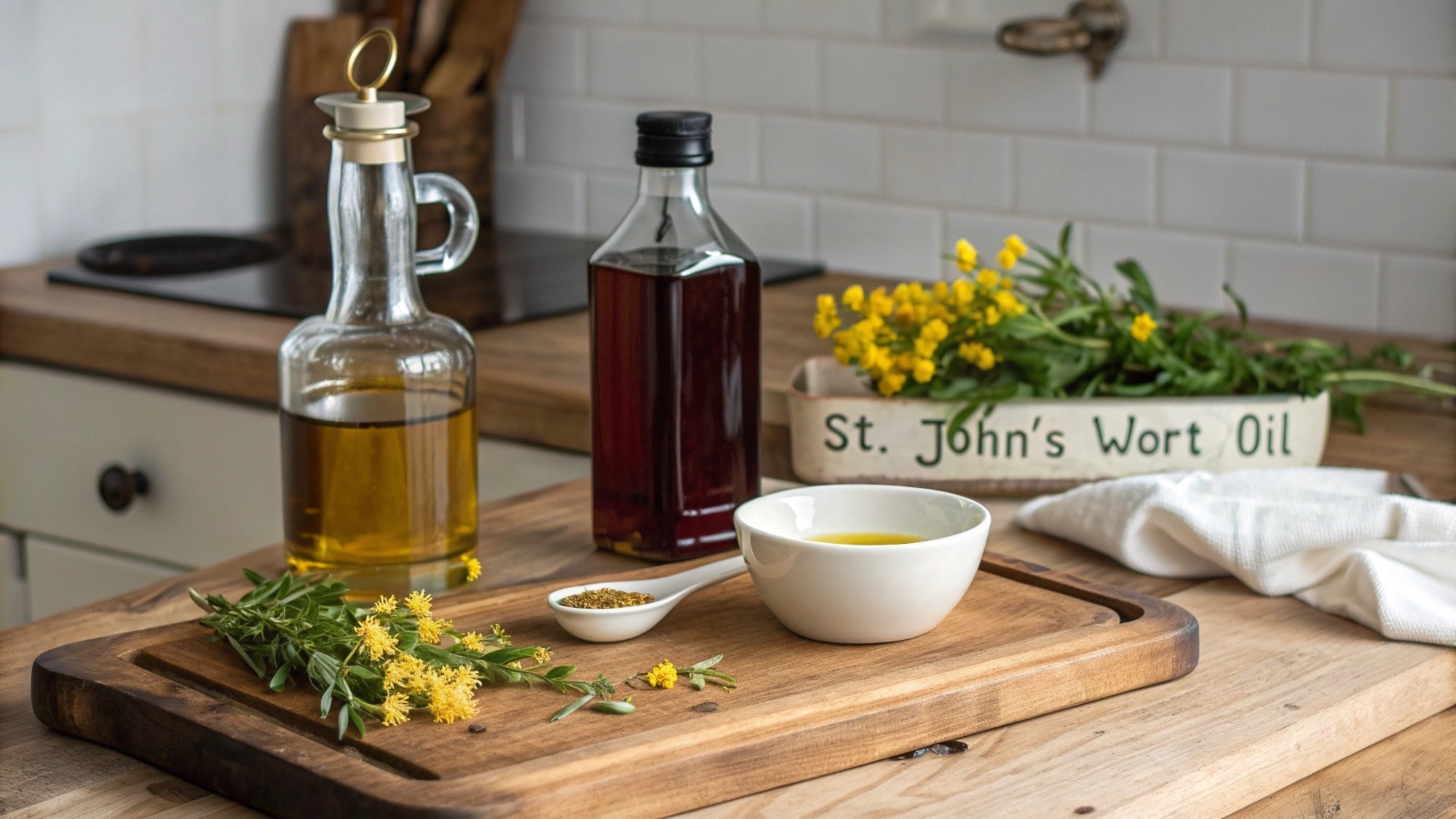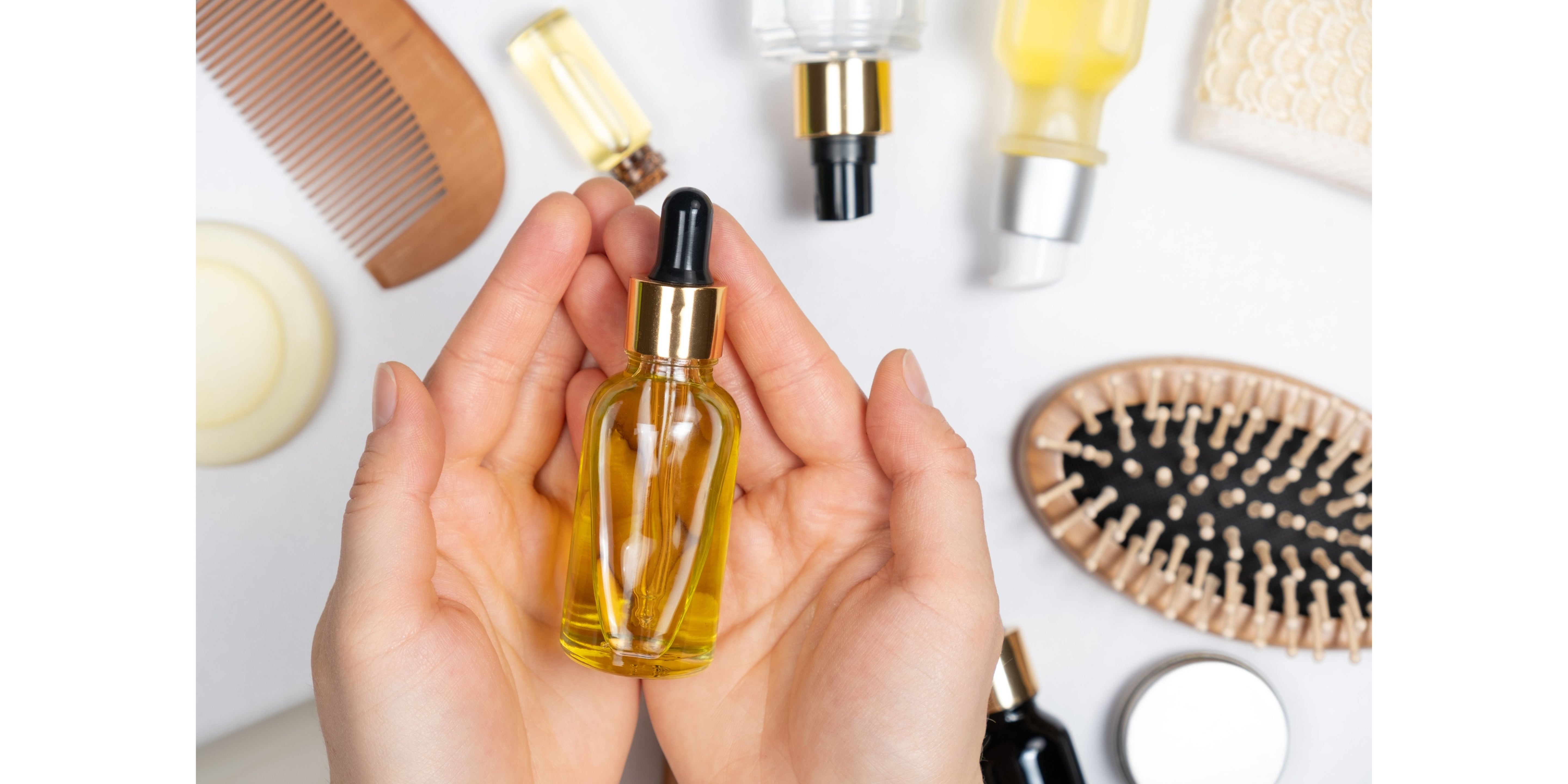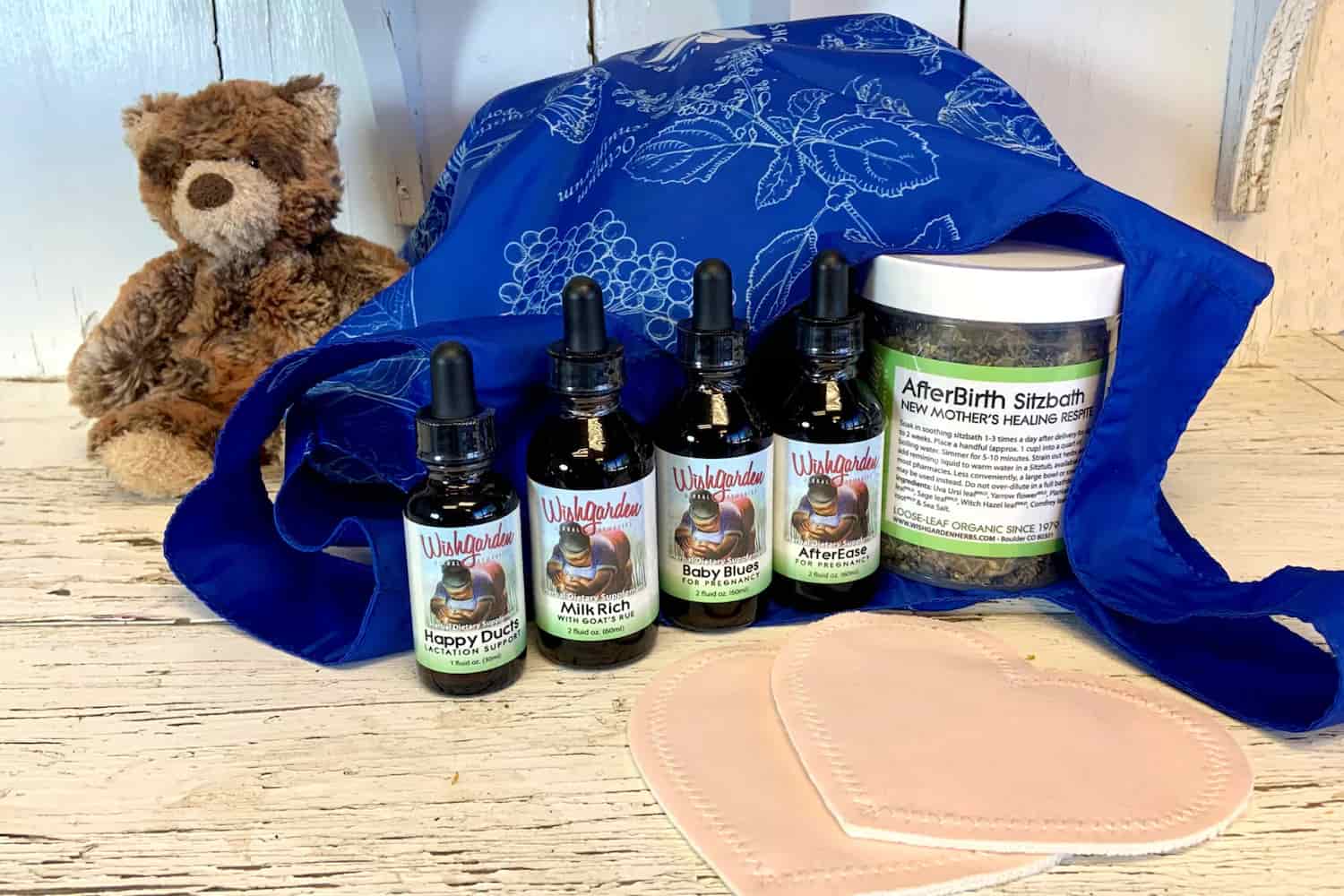
St. John’s Wort Benefits: Herbal Sunshine for Mood & Wellness
Written by Rebecca Younger, CH, CDShare
A sunny day always reminds me of the St. John's wort flower. Nothing captures the essence of warmth and light quite like St. John’s wort!
With its vibrant, sunshine-kissed golden blooms, Hypericum perforatum is cherished as a symbol of vitality and healing. This remarkable herb is celebrated for its beauty and its versatile benefits in herbal medicine. Whether you’re looking to uplift your emotional well-being, combat stressful life chapters, or soothe physical aches, St. John’s wort remains a wellness companion.
Beyond its beauty and cheerful demeanor lies a powerful herbal ally with a fascinating backstory in folklore, tradition, and modern research. From ancient remedies to scientifically studied properties, St. John’s wort has rightfully earned its place in every herbalist’s toolkit as a trusted remedy for both body and mind.
Botanical Background
St. John’s wort, scientifically known as Hypericum perforatum, is a hardy, yellow-flowering plant. Its striking golden blooms and powerful properties are hidden within its petals and leaves. Its name comes from its traditional blooming time around St. John the Baptist’s feast day in late June. Thriving in sunny meadows and along roadsides, this resilient herb carries a wealth of history and botanical intrigue, making it a cherished plant in traditional and modern herbal practices.
Physically, this hardy perennial features sunny yellow flowers with five petals, often speckled with orange or red. Its green leaves have tiny perforations visible when held to the light—a unique trait that inspired its name, “perforatum.” Originally native to Europe and Asia, St. John’s wort has since spread to North America, thriving in dry, rocky terrain and disturbed soil. It loves the sun and flourishes in warm, arid climates, blooming in midsummer.
Its botanical versatility reflects its value in wellness as St. John’s wort thrives where it’s needed most in the body, whether promoting a positive mood or supporting muscle recovery.
A Colorful History
Rich in tradition and folklore, this remarkable herb has played a prominent role in medicine, ritual, and daily life across cultures. Its story is one of transformation and healing, bridging the gap between ancient wisdom and modern science.
Folklore & Cultural Significance
St. John’s wort has been both mystical and medicinal. It was once hung above doorways to ward off evil, and its red oil was believed to symbolize the blood of John the Baptist. This blend of tradition and utility proves its meaningful place throughout history.
Medicinal Use Through the Ages
St. John’s wort has a rich history of medicinal use, spanning centuries and cultures. Its versatility and alluring appeal have made it a staple in traditional and modern medicine alike. Below are some of its most notable applications that have persisted or evolved over time:
Ancient Greece
- The Greek physician Dioscorides, a renowned pharmacologist of his time, documented its use for wound healing and supporting the nervous system. It was often applied topically to cuts and burns, believed to accelerate healing and soothe inflammation.
Medieval Europe
- During the Middle Ages, St. John’s wort was valued as a remedy for melancholy, nervous exhaustion, and balancing moods. It was closely associated with spiritual healing and was often used to ward off dark energy or promote mental clarity.
Early America
- European settlers brought St. John’s wort to the New World, where it became a go-to remedy in poultices for bruises, burns, and minor injuries. Its soothing and healing properties were cherished for physical and emotional ailments and often used in home remedies passed down through generations.
From its origins in ancient Greece to its continued use today, St. John’s wort stands as a testament to the resilience and adaptability of natural medicine. Its ability to support well-being in diverse ways underscores its timeless relevance.
Health Benefits & Medicinal Properties
St. John’s wort extracts have been treasured for centuries as a powerful natural remedy, celebrated for its versatility and variety in wellness applications. From supporting emotional well-being to promoting the body’s natural recovery processes, this herb has earned its place in holistic health. Its benefits are rooted in active compounds like hypericin and hyperforin, contributing to its wide range of effects.
Whether you’re seeking emotional balance, relief from tension, or a way to soothe your skin, St. John’s wort offers a natural, time-tested solution.
Be aware that combining St. John's wort with certain medications, particularly antidepressants, can elevate serotonin levels and lead to the dangerous condition known as serotonin syndrome. Always consult with a practitioner before incorporating herbs to your health regimen if you're using any prescription medications.
Here are a few of its key benefits and how you can incorporate this botanical ally into your daily life.
1. Supports a Positive Mood
It's no wonder this bright yellow flower supports a positive mood. Just being in the plants presence is enough to lift your spirits!
If you're feeling out of sync or weighed down by life’s challenges, St. John’s wort promotes emotional balance and a brighter outlook on life. It works by influencing neurotransmitters in the brain, helping to cultivate positivity and providing a natural alternative to conventional mood support.
Key Benefits:
- It may help alleviate mild-to-moderate mood imbalances, such as occasional feelings of sadness or irritability.
- Supports overall emotional well-being and resilience, helping you navigate daily stressors with a more positive mindset.
- Modern studies by the National Institutes of Health have compared its effectiveness favorably to some conventional options, making it a popular choice for those seeking natural support without the side effects.
How to Use It:
- Incorporate a tincture into your daily wellness routine for consistent emotional support. Tinctures can be taken straight, or added to juices or teas.
- For enhanced mood balance, pair it with complementary herbs like motherwort or lemon balm for enhanced mood balance.
2. Soothes Nervous Tension
Life can be utterly overwhelming and fast paced, and that’s where St. John’s Wort truly shines! It’s considered a nervous trophorestorative, meaning it not only calms the nervous system but also strengthens and nourishes it over time and helps our bodies cope with stress long term.
Use Cases:
- Helps ease feelings of anxiousness and nervous tension, promoting a sense of calm and clarity.
- Supports a calm yet focused mindset, perfect for navigating stressful situations.
- Pair with calming herbs like passionflower, milky oat tops, or scullcap to enhance its soothing effects.
3. Promotes a Healthy Inflammatory Response
Whether you’ve overdone it at the gym or have chronic joint discomfort, this herb is known for supporting a healthy inflammatory response, making it a fantastic ally for post-exercise recovery and physical discomforts.
Common Uses:
- Provides relief from sore muscles, stiffness, or minor strains after physical activity.
- Frequently used in topical oils for a localized remedy for aches or bruises.
- Encourages the body’s natural healing processes for faster recovery.
How to Apply:
- Massage St. John’s wort-infused oil directly onto areas of discomfort for targeted relief.
- Combine it with other soothing herbs like arnica for enhanced recovery, especially after intense workouts or physical strain.
4. Encourages Skin Healing
Historically, St. John’s wort has been valued for supporting the skin’s natural recovery process. From minor cuts and scrapes to irritated or dry skin, this herb offers soothing and restorative properties, making it a key ingredient in holistic skincare.
How to Use It:
- Apply St. John’s wort-infused oil topically to minor skin irritations to promote faster healing.
- Combine it with other powerful herbs like arnica for enhanced relief from post-activity soreness or minor injuries.
- Use it as a natural, gentle remedy for cuts, scrapes, or areas of skin that need extra care.
How to Use St. John’s Wort
St. John’s wort is a trusted ally for both physical and emotional well-being. From boosting your mood and calming your nervous system to soothing sore muscles and supporting skin health, this versatile plant has a lot to offer.
By integrating it into your daily routine, you’re embracing a natural, holistic approach to wellness that prioritizes balance, resilience, and self-care. Whether used alone or paired with other herbs, St. John’s wort is a shining example of how nature can help us lead healthier, more fulfilling lives.
It is important to consult healthcare providers before taking St. John's wort due to potential interactions with other medications.
Popular Preparations
Here are some convenient ways to integrate St. John’s wort into your wellness routine:
- Tinctures – Tinctures are concentrated liquid extracts made by steeping St. John’s wort’s flowering tops in alcohol, water, or glycerine. They are highly potent and offer quick absorption into the body, making them a popular choice for those seeking immediate or targeted relief. Dosages can easily be customized, allowing us to adapt usage to ours specific needs. They are particularly convenient for emotional support or calming the nervous system. A dose can be added to water, tea, or taken directly under the tongue.
- Infusions (Tea) – Traditional herbal tea infusions made from fresh or dried St. John’s wort are a soothing way to experience its benefits. Simply steep the flowering tops in hot water for 5-10 minutes to create a nourishing, herbal beverage that can support emotional balance. Infusions are a great way to enjoy the herb’s more gentle effects and provide a comforting ritual that promotes relaxation and mindfulness throughout the day.
- Oil Infusions – St. John’s wort oil infusions are prepared by soaking the herb in a carrier oil, such as jojoba oil, to extract its unique compounds. These infusions are ideal for topical application to support skin health, soothe irritation, and promote healing of minor cuts and bruises. The richly colored oil, often red, can be used alone or blended with other herbs for synergy, making it a wonderful addition to massages or DIY skincare routines.
- Capsules/Tablets – For those seeking convenience, standardized capsules or tablets offer an easy and precise way to incorporate St. John’s wort into daily wellness. These pre-measured doses ensure consistency, making it accessible for individuals on the go or those who want to avoid the taste or texture of other preparations. Capsules or tablets are especially beneficial for long-term use to support mood and emotional well-being.
Pro Tip: Combine tinctures with complementary herbs for added benefits.
How to Use:
- Massage onto sore muscles and joints.
- Apply to minor burns, bruises, or irritated skin.
- Use as a base oil for making healing salves or balms.
Pro Tip: St. John’s Wort can make your skin more sensitive to sunlight, so avoid applying before sun exposure.
Expanding Pairing with Other Herbs
You can amplify St. John's wort benefits by combining it with complimentary herbs:
- Motherwort & passionflower – Known for their calming and relaxing properties, these herbs create a soothing blend when used with St. John’s wort. This trio is particularly helpful for those soothing stress and balancing mood swings, promoting a sense of peace and balance.
- Milky oat tops – A classic tonic for the nervous system, milky oats combined with St. John’s wort provides long-term support for those dealing with burnout or chronic stress. This pairing can help restore energy, calm frayed nerves, and nourish an overworked system.
- Arnica – Pairing arnica with St. John’s wort in a topical oil creates a dynamic solution for muscle recovery and joint care. This combination is ideal for athletes or anyone recovering from physical exertion or injury. The restorative properties of the two herbs work hand-in-hand to sooth discomfort and swelling and supports a healthy inflammatory response.
- Lemon balm – This gentle herb adds a touch of brightness and tranquility to your herbal regimen. Combined with St. John’s wort, lemon balm helps to uplift the mood, calm nervous stomachs, and support overall digestion, providing a holistic approach to wellness.
- Valerian root – Combining valerian Root with St. John’s wort offers a powerful solution for those looking to improve sleep quality. Valerian enhances relaxation and promotes restful sleep, making this pairing a go-to for broken sleep and restlessness.
- Scullcap – An ideal companion for people with nervous tension, headaches, or feelings of anxiousness, scullcap works beautifully with St. John’s wort for easing mental strain. Together, they create a calming effect and enhance mental clarity.
Exploring these blends allows you to tailor your herbal remedies for specific needs, enriching your wellness routine with the synergistic power of nature’s botanicals.
St. John's wort is a great starting point if you’re new to herbalism or looking to deepen your practice. Its versatility makes experimenting and finding what works best for you easy. As with any herbal remedy, take the time to listen to your body and enjoy the discovery process, it’s just as valuable as the results!
Experience the Sunshine Herb

St. John’s wort is a versatile herbal remedy that supports emotional balance and physical well-being. Renowned for its warming and comforting properties, this herb has been used for centuries to help ease stress and promote a sense of calm.
Whether brewing it into a soothing tea or using it as part of a wellness routine, St. John’s wort is a natural solution to bring warmth and equilibrium when life feels overwhelming.
Beyond its emotional benefits, St. John’s wort also offers relief from physical discomfort. Its infused oils are often massaged into sore muscles to soothe tension and encourage relaxation. Additionally, tinctures featuring this powerful herb are valued for their ability to support recovery and overall vitality. With so many potential uses, it’s no wonder that St. John’s wort has become a go-to herb for those seeking a holistic approach to health. One standout way to experience its soothing touch is through WishGarden's Trauma Ease, an herbal infused oil featuring St. John’s wort, arnica, and calendula. This botanical trio works synergistically to ease sore joints and muscles while also calming irritated skin, making it a must-have for recovery and relief.
If you’re curious to experience the full potential of St. John’s wort, you can lean on WishGarden’s formulas that provide synergistic herb combinations. Formula tinctures like Emotional Ally and Deep Recovery, combine the power of St. John’s wort with other supportive herbs to deliver targeted relief. These blends are designed to help you navigate life’s challenges with resilience and ease. Discover the magic of this incredible herb and elevate your wellness journey!
Rebecca Younger is passionate about herbs and women's health. She aspires to plant seeds of inspiration within her community about plant medicine and healthier ways of life. She studied Herbal Medicine at Herbalism Roots in Denver and is a certified Doula through the Matrona Foundation. She is the Brand Communications Specialist at WishGarden Herbs.
For educational purposes only. This information has not been evaluated by the Food and Drug Administration. This information is not intended to diagnose, treat, cure, or prevent any disease, or to sell any product.



















